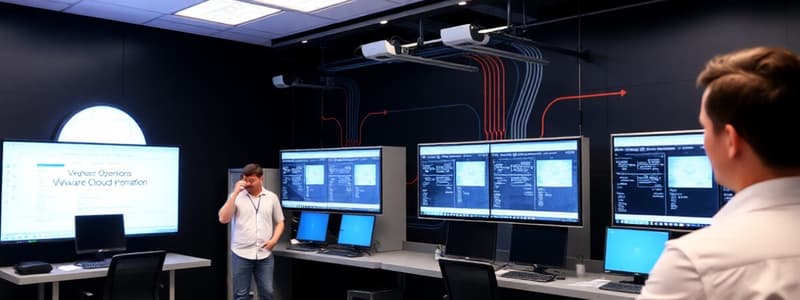Podcast
Questions and Answers
What are the primary tasks involved in Day 2 operations in vSphere with vCenter Server?
What are the primary tasks involved in Day 2 operations in vSphere with vCenter Server?
- Deploying new VMs
- Monitoring performance and responding to user requests (correct)
- Creating backups only
- None of the above
SDDC Manager provides a single dashboard for monitoring multiple environments.
SDDC Manager provides a single dashboard for monitoring multiple environments.
True (A)
What is the importance of applying upgrades and patches in a vSphere environment?
What is the importance of applying upgrades and patches in a vSphere environment?
To maintain security and stability of the environment.
The SDDC Manager automates __________ for the vCenter Server and ESXi hosts.
The SDDC Manager automates __________ for the vCenter Server and ESXi hosts.
Match the following tools with their functionalities:
Match the following tools with their functionalities:
Which of the following is NOT a responsibility of Day 2 operations in vSphere?
Which of the following is NOT a responsibility of Day 2 operations in vSphere?
What is a critical part of capacity planning in SDDC Manager?
What is a critical part of capacity planning in SDDC Manager?
Dynamic scaling of resources is unnecessary in a virtual infrastructure environment.
Dynamic scaling of resources is unnecessary in a virtual infrastructure environment.
SDDC Manager cannot manage user accounts and access privileges.
SDDC Manager cannot manage user accounts and access privileges.
What are two common performance metrics monitored in the vSphere environment?
What are two common performance metrics monitored in the vSphere environment?
What can be managed through SDDC Manager in terms of network configuration?
What can be managed through SDDC Manager in terms of network configuration?
SDDC Manager is used for establishing and maintaining _____ in the environment.
SDDC Manager is used for establishing and maintaining _____ in the environment.
Before applying any __________, a backup is an essential part of the process.
Before applying any __________, a backup is an essential part of the process.
What is a critical feature of the alerting system in SDDC Manager?
What is a critical feature of the alerting system in SDDC Manager?
Match the following features with their description:
Match the following features with their description:
Which of the following is NOT a function of SDDC Manager?
Which of the following is NOT a function of SDDC Manager?
Networking components cannot be customized through vCenter.
Networking components cannot be customized through vCenter.
What is essential for mitigating downtime in an organization using SDDC Manager?
What is essential for mitigating downtime in an organization using SDDC Manager?
Controlling user access to the _____ is crucial for operations.
Controlling user access to the _____ is crucial for operations.
What aspect of resource management can SDDC Manager handle?
What aspect of resource management can SDDC Manager handle?
What is one of the primary functions of vCOAM in performance optimization?
What is one of the primary functions of vCOAM in performance optimization?
Version compatibility has no impact on maintaining operational consistency in the infrastructure.
Version compatibility has no impact on maintaining operational consistency in the infrastructure.
What does vCOAM facilitate in terms of security and compliance?
What does vCOAM facilitate in terms of security and compliance?
Data retention policies can be optimized based on __________ analysis.
Data retention policies can be optimized based on __________ analysis.
Match the following vCOAM functionalities with their descriptions:
Match the following vCOAM functionalities with their descriptions:
Which of the following strategies does vCOAM recommend to ensure infrastructure health?
Which of the following strategies does vCOAM recommend to ensure infrastructure health?
Upgrading components without insights from vCOAM can lead to inconsistencies.
Upgrading components without insights from vCOAM can lead to inconsistencies.
What role does automation play in vCOAM's integration?
What role does automation play in vCOAM's integration?
Maintaining system firmware and updates is essential for stable and __________ operations.
Maintaining system firmware and updates is essential for stable and __________ operations.
Which type of reports does vCOAM provide?
Which type of reports does vCOAM provide?
What is the primary function of the vCenter Operations Management Appliance (vCOAM)?
What is the primary function of the vCenter Operations Management Appliance (vCOAM)?
VCOAM can help in forecasting resource utilization.
VCOAM can help in forecasting resource utilization.
Name one key metric that vCOAM monitors.
Name one key metric that vCOAM monitors.
VCOAM enhances operational efficiency by enabling __________ issue detection.
VCOAM enhances operational efficiency by enabling __________ issue detection.
Which of the following benefits does vCOAM provide?
Which of the following benefits does vCOAM provide?
Customizable alerts in vCOAM are used to identify ongoing IT projects.
Customizable alerts in vCOAM are used to identify ongoing IT projects.
What role does historical data play in troubleshooting?
What role does historical data play in troubleshooting?
Resource allocation and optimization are key to avoiding __________ degradation.
Resource allocation and optimization are key to avoiding __________ degradation.
What is one way vCOAM ensures minimal disruption to the environment?
What is one way vCOAM ensures minimal disruption to the environment?
Flashcards
Day 2 Operations
Day 2 Operations
Ongoing tasks after initial deployment, focusing on managing and maintaining a virtual infrastructure.
vCloud Director
vCloud Director
A tool that simplifies Day 2 tasks by managing vCenter's virtual machines and network, abstracting complex operations.
SDDC Manager
SDDC Manager
A tool within VMware Cloud Foundation that streamlines Day 2 operations in vSphere.
Monitoring
Monitoring
Signup and view all the flashcards
Alerting
Alerting
Signup and view all the flashcards
Patching and Upgrades
Patching and Upgrades
Signup and view all the flashcards
Troubleshooting
Troubleshooting
Signup and view all the flashcards
Resource Management
Resource Management
Signup and view all the flashcards
Dynamic Scaling
Dynamic Scaling
Signup and view all the flashcards
Scaling Policies
Scaling Policies
Signup and view all the flashcards
SDDC Manager Scaling
SDDC Manager Scaling
Signup and view all the flashcards
Capacity Planning
Capacity Planning
Signup and view all the flashcards
User Account Management
User Account Management
Signup and view all the flashcards
Networking Configuration
Networking Configuration
Signup and view all the flashcards
High Availability
High Availability
Signup and view all the flashcards
Disaster Recovery
Disaster Recovery
Signup and view all the flashcards
SDDC Manager & vCenter
SDDC Manager & vCenter
Signup and view all the flashcards
Virtual Network Management
Virtual Network Management
Signup and view all the flashcards
Importance of User Control
Importance of User Control
Signup and view all the flashcards
Why Redundancy Matters
Why Redundancy Matters
Signup and view all the flashcards
vCOAM
vCOAM
Signup and view all the flashcards
Performance Tuning
Performance Tuning
Signup and view all the flashcards
Maintenance and Upgrades
Maintenance and Upgrades
Signup and view all the flashcards
Security and Compliance
Security and Compliance
Signup and view all the flashcards
Automation
Automation
Signup and view all the flashcards
Reporting and Analytics
Reporting and Analytics
Signup and view all the flashcards
Data Retention Planning
Data Retention Planning
Signup and view all the flashcards
Version Compatibility
Version Compatibility
Signup and view all the flashcards
System Firmware and Updates
System Firmware and Updates
Signup and view all the flashcards
Key Metrics
Key Metrics
Signup and view all the flashcards
Dashboards
Dashboards
Signup and view all the flashcards
Actionable Insights
Actionable Insights
Signup and view all the flashcards
Machine Learning
Machine Learning
Signup and view all the flashcards
Proactive Issue Detection
Proactive Issue Detection
Signup and view all the flashcards
Improved Efficiency
Improved Efficiency
Signup and view all the flashcards
Study Notes
Day 2 Operations in vSphere with vCenter Server
- Day 2 operations in vSphere with vCenter Server involve maintaining and managing a virtual infrastructure after deployment.
- Tasks include monitoring performance, handling user requests, applying updates, and managing resource consumption.
- Tools like vCloud Director manage some vCenter tasks, abstracting Day 2 operations.
Day 2 Operations in VMware Cloud Foundation 5.2 SDDC Manager
- Day 2 operations use built-in VMware Cloud Foundation 5.2 SDDC Manager tools to manage vSphere infrastructure.
- These tools automate tasks like monitoring, patching, and troubleshooting.
Monitoring and Alerting
- SDDC Manager utilizes vSphere and vCenter functionalities for monitoring.
- Consolidated dashboards provide insights into VM and host performance, resource usage, and overall health.
- Monitoring tracks CPU, memory, disk, and network utilization thresholds.
- Alerting systems notify administrators of potential issues when thresholds are exceeded.
- vCOAM monitors key metrics, including CPU, memory, storage I/O, and network performance across components, providing actionable intelligence.
- Customizable alerts and thresholds alert administrators to potential issues early on.
Patching and Upgrades
- SDDC Manager automates vCenter Server, ESXi host, and other component patching/upgrades via APIs or vCenter updates.
- Scheduled tasks automate updates for efficient Day 2 operations.
- Upgrades/patches maintain environment security and stability.
- Backups are crucial before patching/upgrades to mitigate risks.
- Maintenance and upgrades are tracked and managed in the vSphere client interface alongside vCOAM.
- Version compatibility is essential for consistent infrastructure operations.
- Planning and scheduling maintenance based on vCOAM recommendations reduces downtime.
- Upgrading components using vCOAM insights ensures a seamless upgrade process.
Troubleshooting and Problem Resolution
- SDDC Manager's built-in tools diagnose and resolve issues.
- Detailed logs and metrics aid troubleshooting.
- Troubleshooting involves log review, performance metric monitoring, and checking resource allocation/configurations.
- Identifying and resolving issues is facilitated by actionable insights from vCOAM dashboards and reports.
- Analyzing historical data (logs) using vCOAM provides context for evaluating performance issues and resource utilizations.
Resource Management and Scaling
- Dynamic resource scaling addresses fluctuating workloads via scaling policies.
- SDDC Manager scales resources (CPU, memory, network) based on thresholds or user requests.
- Capacity planning and scaling policies ensure consistent performance.
- vCOAM aids in capacity planning by forecasting resource utilization and predicting potential bottlenecks.
- Resource allocation and optimization are key to avoiding performance degradation and maintaining operational stability.
- Administrators can effectively predict demand and allocate resources accordingly.
- Understanding current and projected resource needs using performance data helps in making informed decisions.
User Account Management
- SDDC Manager manages vCenter user accounts and access privileges.
- Managing user access is vital for environment security.
Networking Management
- SDDC Manager manages network configurations, providing network component visibility and resource allocation details.
- Virtual networks, subnets, VLANs, and routing are configurable via vCenter and/or SDDC Manager.
High Availability and Disaster Recovery
- SDDC Manager establishes environment high availability and disaster recovery sites using vCenter/vSphere features.
- Redundancy and disaster recovery sites minimize downtime and support business continuity.
- Data retention planning can be enhanced by leveraging vCOAM and its trend analysis features to optimize policies and processes.
- Recovery plans can be devised and verified for potential disaster recovery scenarios
Performing Day 2 Operations in vSphere with vCenter Operations Management
- Day 2 operations in vSphere with vCenter Operations Management focus on maintaining, optimizing, and troubleshooting the virtual infrastructure after initial deployment and configuration.
vCenter Operations Management Appliance
- The vCenter Operations Management Appliance (vCOAM) is a powerful tool for monitoring and managing the VMware SDDC.
- It provides comprehensive insights into the health, performance, and capacity of the virtual infrastructure.
- vCOAM enables proactive issue detection and resolution, leading to improved operational efficiency and reduced downtime.
- The appliance collects metrics from various components of the infrastructure, such as ESXi hosts, virtual machines, and storage.
- This data is analyzed and presented in various dashboards, reports, and alerts, using machine learning to provide actionable intelligence.
- Comprehensive reports provide historical data analysis and trends, helping evaluate performance and potential issues.
Performance Tuning and Optimization
- vCOAM dashboards help pinpoint areas of degraded performance enabling targeted optimization strategies.
- Performance insights gathered from the vCOAM can be used to tune various facets to elevate the overall system performance.
- The analytics provide actionable suggestions, such as optimizing VM configurations, storage policies, or network settings, to improve performance and efficiency.
- Tuning VM configurations enhances resource utilization based on the vCOAM insights.
Security and Compliance
- vCOAM enables proactive monitoring for potential security risks and compliance breaches.
- It provides the ability to enforce policies and configurations and promotes compliance with industry standards and policies.
- Security advisories can be tracked using vCOAM.
Cloud Management and Automation
- vCOAM integration reduces the burden on manual operations and improves efficiency through automation.
- Implementing automation practices using the insights reduces the management overhead and eliminates potential errors.
Reporting and Analytics
- Customizable reports generate valuable insights into the system's performance.
Backup and Recovery
- Data retention planning can be optimized based on trend analysis from vCOAM.
Studying That Suits You
Use AI to generate personalized quizzes and flashcards to suit your learning preferences.
Description
This quiz covers Day 2 operations in vSphere with vCenter Server and VMware Cloud Foundation 5.2 SDDC Manager. It focuses on ongoing tasks such as monitoring, performance management, updates, and troubleshooting in virtual infrastructure environments. Test your knowledge of the tools and features essential for effective virtualization management.




